Fleurs du Mal Magazine


Or see the index

To The Sun
Great Phoebus ! thou on whom we all depend
For countless joys which thou alone canst send,
A saturated mortal to thee speaks,
And for an answer to this question seeks —
Where hast thou been through all these sloppy weeks?
Oh ! by sweet thoughts of punt and shade and pipe.
By horrid dreams of Fruit far, far from ripe,
By hopes of pleasures culled throughout the “Long,”
By thoughts of Margate with its ni^er song.
By trips proposed upon the “Continong”;
Shine forth, O mighty Sun ! and turn thy face
On match, regatta, party, pic-nic, race;
Dispel the gloom that o’er our island lowers,
And people all the land with countless flowers,
And let us have at least some rainless hours.
Let Bobbies murmur in the Street of Bow,
And swear that on their beat they will not go:
Let Postmen fill our souls with endless fears
That correspondence may get in arrears :
Let thoughts of striking fill our Grenadiers :
Let all these cease from labour, if they like ;
But thou, great Sun-god, go not thou on strike!
Montague Horatio Mostyn Turtle Pigott
(1865–1927)
To The Sun (Poem)
•fleursdumal.nl magazine
More in: Archive O-P, Archive O-P, Mostyn Turtle Pigott

Brought together for the first time, here are 100 pieces of ‘Oulipo’ writing, celebrating the literary group who revelled in maths problems, puzzles, trickery, wordplay and conundrums.
Featuring writers including Georges Perec, Raymond Queneau and Italo Calvino, it includes poems, short stories, word games and even recipes. Alongside these famous Oulipians, are ‘anticipatory’ wordsmiths who crafted language with unusual constraints and literary tricks, from Jonathan Swift to Lewis Carroll.
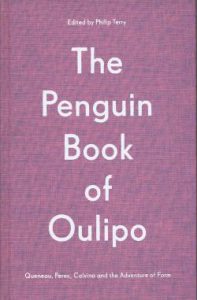 Philip Terry is a translator, and a writer of fiction and poetry. He has translated the work of Georges Perec, Stéphane Mallarmé and Raymond Queneau, and is the author of the novel tapestry, shortlisted for the Goldsmiths Prize.
Philip Terry is a translator, and a writer of fiction and poetry. He has translated the work of Georges Perec, Stéphane Mallarmé and Raymond Queneau, and is the author of the novel tapestry, shortlisted for the Goldsmiths Prize.
His poetry volumes include Oulipoems, Shakespeare’s Sonnets, Dante’s Inferno (a Times Literary Supplement Book of the Year, London Review Bookshop Book of the Week, and recipient of a Society of Authors Travelling Scholarship Prize), Quennets, and Dictator, a version of the Epic of Gilgamesh in Globish.
He is currently translating Ice Age signs from the caves at Lascaux.
• ‘Philip Terry’s collection is packed with fabulous, wide-ranging work that displays the full ingenuity, brio and originality of Oulipian ideals in action. An exhilarating feat of in-depth reading, and translating, it takes its place as the definitive anthology in English for decades to come.’ – Marina Warner
• Philip Terry’s playful selection will appeal to lovers of word games, puzzles and literary delights.
The Penguin Book of Oulipo
Queneau, Perec, Calvino and the Adventure of Form
Edited by Philip Terry
Imprint: Penguin Classics
Published: 31/10/2019
ISBN: 9780241378427
Hardcover
Length: 576 Pages
Dimensions: 240mm x 49mm x 162mm
RRP: £25.00
# new books
The Penguin Book of Oulipo
Queneau, Perec, Calvino and the Adventure of Form
Philip Terry (Edited by)
• fleursdumal.nl magazine
More in: #Archive Concrete & Visual Poetry, - Book Lovers, - Book News, - Objets Trouvés (Ready-Mades), Archive C-D, Archive O-P, Archive Q-R, Art & Literature News, AUDIO, CINEMA, RADIO & TV, Carroll, Lewis, Dadaïsme, Georges Perec, OULIPO (PATAFYSICA), Surrealisme, Swift, Jonathan
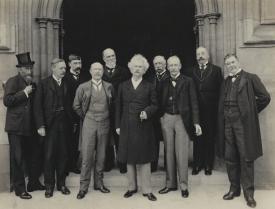
Editors Note
A haggard youth with glittering eye
Into our presence sped;
He placed these verses on our desk,
A pistol at our head.
Well, we didn’t much want to be bored with his
lead.
So our readers we bore with his verses instead.
Montague Horatio Mostyn Turtle Pigott
(1865–1927)
Editors Note (Poem)
• fleursdumal.nl magazine
More in: Archive O-P, Archive O-P, Mostyn Turtle Pigott
An investigation of the irrational and the unconventional currents swirling behind the Bauhaus’s signature sleek surfaces and austere structures.
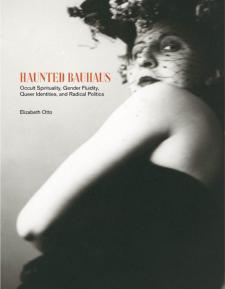 The Bauhaus (1919–1933) is widely regarded as the twentieth century’s most influential art, architecture, and design school, celebrated as the archetypal movement of rational modernism and famous for bringing functional and elegant design to the masses. In Haunted Bauhaus, art historian Elizabeth Otto liberates Bauhaus history, uncovering a movement that is vastly more diverse and paradoxical than previously assumed. Otto traces the surprising trajectories of the school’s engagement with occult spirituality, gender fluidity, queer identities, and radical politics. The Bauhaus, she shows us, is haunted by these untold stories.
The Bauhaus (1919–1933) is widely regarded as the twentieth century’s most influential art, architecture, and design school, celebrated as the archetypal movement of rational modernism and famous for bringing functional and elegant design to the masses. In Haunted Bauhaus, art historian Elizabeth Otto liberates Bauhaus history, uncovering a movement that is vastly more diverse and paradoxical than previously assumed. Otto traces the surprising trajectories of the school’s engagement with occult spirituality, gender fluidity, queer identities, and radical politics. The Bauhaus, she shows us, is haunted by these untold stories.
The Bauhaus is most often associated with a handful of famous artists, architects, and designers—notably Paul Klee, Walter Gropius, László Moholy-Nagy, and Marcel Breuer. Otto enlarges this narrow focus by reclaiming the historically marginalized lives and accomplishments of many of the more than 1,200 Bauhaus teachers and students (the so-called Bauhäusler), arguing that they are central to our understanding of this movement. Otto reveals Bauhaus members’ spiritual experimentation, expressed in double-exposed “spirit photographs” and enacted in breathing exercises and nude gymnastics; their explorations of the dark sides of masculinity and emerging female identities; the “queer hauntology” of certain Bauhaus works; and the role of radical politics on both the left and the right—during the school’s Communist period, when some of the Bauhäusler put their skills to work for the revolution, and, later, into the service of the Nazis.
With Haunted Bauhaus, Otto not only expands our knowledge of a foundational movement of modern art, architecture, and design, she also provides the first sustained investigation of the irrational and the unconventional currents swirling behind the Bauhaus’s signature sleek surfaces and austere structures. This is a fresh, wild ride through the Bauhaus you thought you knew.
Elizabeth Otto is an art historian and the author of Tempo, Tempo! The Bauhaus Photomontages of Marianne Brandt, the coauthor of Bauhaus Women: A Global Perspective, and the coeditor of five books including Bauhaus Bodies: Gender, Sexuality, and Body Culture in Modernism’s Legendary Art School. She is Associate Professor at the University at Buffalo (SUNY), where she has also served as the Executive Director of the Humanities Institute. Her work has been supported by numerous organizations including the Alexander von Humboldt Foundation, the Center for Advanced Study in the Visual Arts, the National Humanities Center, and the University at Pittsburgh’s Humanities Center.
Elizabeth Otto
Haunted Bauhaus:
Occult Spirituality, Gender Fluidity,
Queer Identities, and Radical Politics
Hardcover
$34.95 T | £28.00
ISBN: 9780262043298
296 pp.
55 color photos
26 b&w illus.
September 2019
The MIT Press
# new books
Haunted Bauhaus
Elizabeth Otto
• fleursdumal.nl magazine
More in: - Book News, - Book Stories, Archive O-P, Art & Literature News, Bauhaus, Klee, Paul
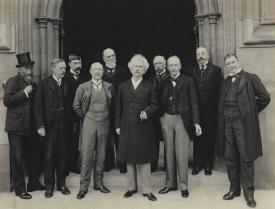
A Lament
They beat me black; they beat me blue,
Until my rue-
-ful visage would not bear inspection;
They broke me, too,
Though ’twas I who
Was once considered quite perfection.
How things are changed ! I once was great,
But yet of late
IVe fallen from my proud position ;
Hard is my fate,
I’m out of date ;
How altered now is my condition !
How will it end? What’s Fate’s decree?
Perchance Til be
Hung high as Haman by a neck-cord ;
Oh ! pity me,
For here you see
A broken, battered, shattered record.
Montague Horatio Mostyn Turtle Pigott
(1865–1927)
A Lament (Poem)
•fleursdumal.nl magazine
More in: Archive O-P, Archive O-P, Mostyn Turtle Pigott
A Little Novel
(in four little chapters)
CHAP. I
A little nook in garden shady;
A little squeeze of finger-tips ;
A little question to a lady;
A little “Yes** from rosy lips.
CHAP. II
A little flirting with another;
A little shadow on a blind;
A little tiff, a little bother:
A little bit of Beauty’s mind.
CHAP. III
A little coolness in the greeting;
A little rift within the lute;
A little hour of wild entreating;
A little lady, proudly mute.
CHAP. IV
A little note of sad upbraiding ;
A little poison in a glass;
A little willow-tree o’ershading
A little tomb-stone in the grass.
Montague Horatio Mostyn Turtle Pigott
(1865–1927)
Melody versus Malady (Poem)
• fleursdumal.nl magazine
More in: Archive O-P, Archive O-P, Mostyn Turtle Pigott

Melody versus Malady
[The Lancet recently discussed the value of music in the
treatment of disease.]
Away with all doctors and physic-concocters !
Down with surgeons and down with physicians !
In future hautboys will replace • doctor’s boys,
And when ailing we’ll send for musicians.
The gentle guitar will soon banish catarrh,
The organ organic diseases ;
The ophicleide serves to establish the nerves,
The mandolin measles appeases.
If you catch influenza just try a cadenza
On the harmless and homely harmonium,
And if you complain of a sprain or a strain
Then summon the soothing euphonium.
Try the cornet for corns and for ague French horns,
And if you should feel very sick or low
Try an air on the lute, a few notes from the flute.
Or the piercing yet popular piccolo.
Montague Horatio Mostyn Turtle Pigott
(1865–1927)
Melody versus Malady (Poem)
• fleursdumal.nl magazine
More in: Archive O-P, Archive O-P, Mostyn Turtle Pigott
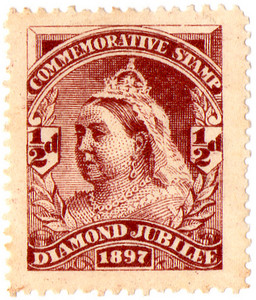
The Philatelist*
(*A man who collects stamps cares for nothing else in the world.)
” O come,” said Music, “come with me ;
To Adelina Patti list;
Melt in her magic melody ” —
“I shan’t !” quoth the Philatelist.
“Come,” said the Gourmand, “come with me.
And try the varied Gatti-list;
I prithee, try Gastronomy” —
“I won’t!” quoth the Philatelist.
” Come,” said the Eightsman, ” come with me”,
And to the merry rattle list;
“Come, join our cheery crew, and we ” —
” Please go!” quoth the Philatelist.
” Come”, said the Farmer, ” come with me”.
And to my lowing cattle list :
“They’re’ slowly winding o’er the lea ” —
” Let them !” quoth the Philatelist.
“Come,” said the Mother, “come with me,
And to my cherub’s prattle list ;
Come, take the babe upon thy knee” —
“No, thanks!” quoth the Philatelist
“Come,” said the Warrior, “come with me,
And to the roar of battle list;
Come, join our valiant company” —
“Not me!” quoth the Philatelist.
“Come,” said Society, “with me,
And to my tittle-tattle list;
“Come, try the World, the Flesh, the D— “
“Get out!” quoth the Philatelist.
Montague Horatio Mostyn Turtle Pigott
(1865–1927)
The Philatelist (Poem)
• fleursdumal.nl magazine
More in: Archive O-P, Archive O-P, Mostyn Turtle Pigott
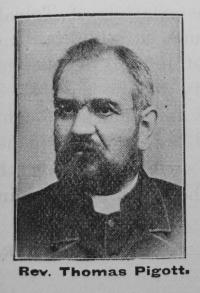
The Lion
(Being an essay written by a pupil
in Dame Europa’s School)
The Lion is a kind of Ass,
His silliness is simply crass ;
He’s such a tame, long-suffering beast
You cannot rile him in the least,
For, though he’s very, very strong,
He never will resent a wrong ;
So, though he’s very, very big.
The other beasts don’t care a fig,
But pinch his tail and tweak his ear.
For he won’t mind — He’s such a dear !
They give him most tremendous snubs.
And kill whole litters of his cubs ;
He’ll sometimes give one little roar,
Montague Horatio Mostyn Turtle Pigott
(1865–1927)
The Lion (Poem)
• fleursdumal.nl magazine
More in: Archive O-P, Mostyn Turtle Pigott, Natural history
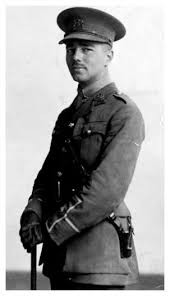
Strange Meeting
It seemed that out of battle I escaped
Down some profound dull tunnel, long since scooped
Through granites which titanic wars had groined.
Yet also there encumbered sleepers groaned,
Too fast in thought or death to be bestirred.
Then, as I probed them, one sprang up, and stared
With piteous recognition in fixed eyes,
Lifting distressful hands, as if to bless.
And by his smile, I knew that sullen hall,—
By his dead smile I knew we stood in Hell.
With a thousand fears that vision’s face was grained;
Yet no blood reached there from the upper ground,
And no guns thumped, or down the flues made moan.
“Strange friend,” I said, “here is no cause to mourn.”
“None,” said that other, “save the undone years,
The hopelessness. Whatever hope is yours,
Was my life also; I went hunting wild
After the wildest beauty in the world,
Which lies not calm in eyes, or braided hair,
But mocks the steady running of the hour,
And if it grieves, grieves richlier than here.
For by my glee might many men have laughed,
And of my weeping something had been left,
Which must die now. I mean the truth untold,
The pity of war, the pity war distilled.
Now men will go content with what we spoiled.
Or, discontent, boil bloody, and be spilled.
They will be swift with swiftness of the tigress.
None will break ranks, though nations trek from progress.
Courage was mine, and I had mystery;
Wisdom was mine, and I had mastery:
To miss the march of this retreating world
Into vain citadels that are not walled.
Then, when much blood had clogged their chariot-wheels,
I would go up and wash them from sweet wells,
Even with truths that lie too deep for taint.
I would have poured my spirit without stint
But not through wounds; not on the cess of war.
Foreheads of men have bled where no wounds were.
“I am the enemy you killed, my friend.
I knew you in this dark: for so you frowned
Yesterday through me as you jabbed and killed.
I parried; but my hands were loath and cold.
Let us sleep now. . . .”
Wilfred Owen
(1893 – 1918)
Strange Meeting (Poem)
• fleursdumal.nl magazine
More in: Archive O-P, Archive O-P, Galerie des Morts, Owen, Wilfred, WAR & PEACE
Het Portugese woord pessoa komt van het Latijnse persona, dat zowel ‘mens’ als ‘masker’ betekent.
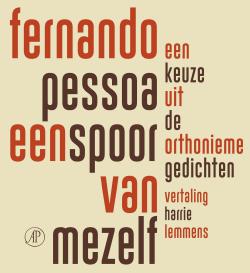 Precies daar moeten we Fernando Pessoa plaatsen, in de wereld van schijn, vermomming, spel, fictie. Hij vergelijkt zichzelf met een podium waarop allerlei acteurs rondlopen.
Precies daar moeten we Fernando Pessoa plaatsen, in de wereld van schijn, vermomming, spel, fictie. Hij vergelijkt zichzelf met een podium waarop allerlei acteurs rondlopen.
Zijn bekendste heteroniemen zijn Bernardo Soares (schrijver van het Boek der rusteloosheid) en de dichters Alberto Caeiro, Ricardo Reis en Álvaro de Campos. Pessoa heeft echter ook onder zijn eigen naam gedichten geschreven. Van dat orthonieme werk zag maar weinig het licht tijdens zijn leven.
Pas lang na zijn dood werden alle losse orthonieme gedichten bijeengebracht in drie delen van elk ruim vijfhonderd bladzijden.
Fernando Pessoa (1888-1935) was een groot Portugees dichter. Bij leven publiceerde deze kantoorklerk uit Lissabon slechts enkele werken. Na zijn dood werd op zijn huurkamer een kist aangetroffen met 27 duizend vol gekrabbelde velletjes. Uit die chaos kon een kolossaal oeuvre worden samengesteld. Niet dat van één dichter, maar van zo’n 25 ‘heteroniemen’ – afzonderlijke ‘schrijverspersoonlijkheden’ met elk een eigen stijl en woordkeus. Pessoa stierf op 47-jarige leeftijd, hij dronk zich dood.
De Arbeiderspers heeft de exclusieve vertaalrechten op zijn oeuvre. August Willemsen (1936-2007) vertaalde het leeuwendeel daarvan en schreef als introductie op de Pessoa-bibliotheek: Het ik als vreemde.
Auteur: Fernando Pessoa
Een spoor van mezelf.
Een keuze uit de orthonieme gedichten
Vertaler: Harrie Lemmens
Nederlands
Uitgeverij: De Arbeiderspers
NUR: 306
Poëzie
Paperback
296 pagina’s
ISBN: 9789029526456
Prijs: € 24,99
Publicatiedatum: 04-06-2019
• fleursdumal.nl magazine
More in: - Book News, Archive O-P, Archive O-P, Pessoa, Fernando, TRANSLATION ARCHIVE
10 décembre 1919: le prix Goncourt est attribué à Marcel Proust pour À l’ombre des jeunes filles en fleurs.
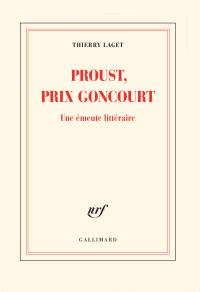 Aussitôt éclate un tonnerre de protestations : anciens combattants, pacifistes, réactionnaires, révolutionnaires, chacun se sent insulté par un livre qui, ressuscitant le temps perdu, semble dédaigner le temps présent.
Aussitôt éclate un tonnerre de protestations : anciens combattants, pacifistes, réactionnaires, révolutionnaires, chacun se sent insulté par un livre qui, ressuscitant le temps perdu, semble dédaigner le temps présent.
Pendant des semaines, Proust est vilipendé dans la presse, brocardé, injurié, menacé. Son tort? Ne plus être jeune, être riche, ne pas avoir fait la guerre, ne pas raconter la vie dans les tranchées.
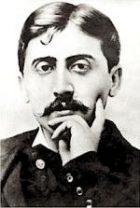 Retraçant l’histoire du prix et les manœuvres en vue de son attribution à Proust, s’appuyant sur des documents inédits, dont il dévoile nombre d’extraits savoureux, Thierry Laget fait le récit d’un événement inouï – cette partie de chamboule-tout qui a déplacé le pôle magnétique de la littérature – et de l’émeute dont il a donné le signal.
Retraçant l’histoire du prix et les manœuvres en vue de son attribution à Proust, s’appuyant sur des documents inédits, dont il dévoile nombre d’extraits savoureux, Thierry Laget fait le récit d’un événement inouï – cette partie de chamboule-tout qui a déplacé le pôle magnétique de la littérature – et de l’émeute dont il a donné le signal.
Thierry Laget
Proust, prix Goncourt. Une émeute littéraire
Collection Blanche, Gallimard
Parution : 04-04-2019
272 pages
140 x 205 mm
ISBN : 9782072846786
Genre : Essais
Prix €19,50
# new books
Thierry Laget
Proust
prix Goncourt
• fleursdumal.nl magazine
More in: - Book News, Archive K-L, Archive O-P, Archive O-P, Art & Literature News, Awards & Prizes, Marcel Proust, Proust, Marcel
Thank you for reading Fleurs du Mal - magazine for art & literature